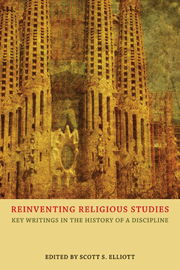Book contents
- Frontmatter
- Contents
- Introduction
- 1 For such a time as this: the Council of Societies for the Study of Religion, 1969–2009
- Part I Inventing and reinventing the field of religious studies
- Part II Method and theory in religious studies
- Part III Teaching religion
- Part IV Women and the bible in religious studies
- 20 For the advancement of my career: a form critical study in the art of acknowledgement
- 21 Women's studies in religion
- 22 The debut of the Bible as a pagan classic
- 23 Bible and religion
- Part V Religion and religious studies in civic life
- Part VI Religious studies and identity politics
- Part VII Islam and 9/11
- Bibliography
- Acknowledgments
- Index
20 - For the advancement of my career: a form critical study in the art of acknowledgement
from Part IV - Women and the bible in religious studies
- Frontmatter
- Contents
- Introduction
- 1 For such a time as this: the Council of Societies for the Study of Religion, 1969–2009
- Part I Inventing and reinventing the field of religious studies
- Part II Method and theory in religious studies
- Part III Teaching religion
- Part IV Women and the bible in religious studies
- 20 For the advancement of my career: a form critical study in the art of acknowledgement
- 21 Women's studies in religion
- 22 The debut of the Bible as a pagan classic
- 23 Bible and religion
- Part V Religion and religious studies in civic life
- Part VI Religious studies and identity politics
- Part VII Islam and 9/11
- Bibliography
- Acknowledgments
- Index
Summary
Finally I must somehow find words enough to thank my wife for her part in this study. It will not be easy, for not only has she done supremely well all those wifely things which author-husbands seem to need but also she has typed draft after experimental draft of manuscript and cheerfully has hacked her way through the jungle of my handwritten pages.
(Ferre 1961: viii)A quick survey of a scholarly library in the humanities will reveal a popular, though little studied, literary form, “the acknowledgment to the wife,” which brings to light a common problem of women in the academic world. We turned to the library closest at hand, a religious studies library, but the form appears with equal frequency in libraries of other disciplines. An analysis of the conventions of this form (which, in most scholarly books in the humanities, is found at the end of a list of acknowledgments to mentors, librarians, editors, and sometimes typists) reveals a socio-political presupposition of academic publishing in America. The political fact is that an academician needs a wife to manage his life for him, to raise his children, and to put up with his irritability so that he can have the leisure to devote himself to the creative work of his scholarly concern.
In the above example of the art, two of the five themes which appear and reappear in “the acknowledgment to the wife” are represented. These we shall call (1) “the wife as typist” theme and (2) “the wife as wife” (or “all those wifely things”) theme.
- Type
- Chapter
- Information
- Reinventing Religious StudiesKey Writings in the History of a Discipline, pp. 119 - 123Publisher: Acumen PublishingPrint publication year: 2013



